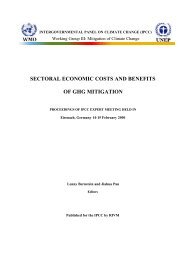Pacific Islands Environment Outlook - UNEP
Pacific Islands Environment Outlook - UNEP
Pacific Islands Environment Outlook - UNEP
You also want an ePaper? Increase the reach of your titles
YUMPU automatically turns print PDFs into web optimized ePapers that Google loves.
PUBLIC PARTICIPATION 43<br />
●<br />
●<br />
●<br />
training for local communities in sustainable<br />
agriculture and fisheries practices in Samoa;<br />
Participatory Rural Appraisal (PRA) workshops for<br />
local communities and conservation officials in<br />
Solomon <strong>Islands</strong>;<br />
some domestic measures in the area of biodiversity<br />
and nature conservation have also broken new ground<br />
by using traditional practices and customary<br />
ownership to support conservation measures in the<br />
coastal fishery, as in Samoa; these measures have<br />
been particularly participatory in nature, as is<br />
described in Box 2.5 outlining Convention on<br />
Biological Diversity activities.<br />
The importance of non-government organizations (NGOs)<br />
in the region also needs to be highlighted. The role of<br />
NGOs in promoting participatory and grassroots<br />
development is well recognized. NGOs are effective<br />
vehicles in encouraging and empowering the<br />
disadvantaged to play a greater role in improving their<br />
own well-being. Increasingly, NGOs are working hand-inhand<br />
with governments and development partners in<br />
national development efforts. The potential of many<br />
indigenous NGOs and community-based organizations in<br />
helping to promote human development is, however, not<br />
fully realized because of inadequate management<br />
capability, lack of skills in programme planning and<br />
implementation and often weak project accountability and<br />
monitoring systems.<br />
NGOs at the regional level include the <strong>Pacific</strong> <strong>Islands</strong><br />
Association of NGOs (PIANGO), which functions as a<br />
regional NGO association focusing on the organization<br />
and regional development of NGOs in the <strong>Pacific</strong>. Most<br />
countries have a national umbrella NGO association, such<br />
as DSE in the Solomon <strong>Islands</strong>, and the Tuvalu<br />
Association of NGOs (TANGO) in Tonga and Tuvalu. The<br />
Foundation for the Peoples of the South <strong>Pacific</strong> (FSP) is<br />
a regional non-profit organization aiming to work with the<br />
<strong>Pacific</strong> people in human development programmes and to<br />
improve the quality of life for village people. Activities<br />
range from rural housing construction programmes and<br />
income generation projects to community forestry<br />
activities. FSP is present in Solomon <strong>Islands</strong>, Vanuatu<br />
and Tonga. NGOs at the international level, such as the<br />
World Wide Fund for Nature (WWF), The Nature<br />
Conservancy (TNC) and Greenpeace, also play a<br />
significant role in the promotion of environmental<br />
management and sustainable development in the region.<br />
At the national level, there are a growing number of<br />
NGOs, with a range of mandates and objectives: women’s<br />
development programmes, research (ecological, historical,<br />
cultural), disaster relief, the co-ordination of youth<br />
activities, adult literacy programmes, farmer support<br />
programmes, family planning programmes and academic<br />
institutions such as USP extension service centres that,<br />
for example, run community training programmes in<br />
Tonga. Some NGOs, such as the Girl Guides Association in<br />
the Cook <strong>Islands</strong>, have developed environmental policies.<br />
Vanuatu and Solomon <strong>Islands</strong> have in recent years<br />
witnessed the establishment of the Vanuatu <strong>Environment</strong><br />
Organization (VEO) and the Solomon <strong>Islands</strong> Indigenous<br />
Peoples <strong>Environment</strong> Organization (SIIPEO).<br />
During the last decade, there has been an important<br />
shift in the direction of NGO activity. During the 1980s,<br />
the crisis of the rainforest worldwide led a number of<br />
international NGOs to conduct campaigns to ‘stop<br />
logging’. In the <strong>Pacific</strong>, some NGOs from Australia and<br />
New Zealand followed this line, whereas others adopted a<br />
slightly different approach. They became involved on the<br />
ground and looked for options available to forest owners<br />
to derive income in other ways, such as investment in<br />
eco-tourism and eco-timber.<br />
Over the same period, and sometimes with support<br />
from offshore NGOs, the local movement became more<br />
active, especially in PNG and the Solomon <strong>Islands</strong>. This<br />
local thrust was partly towards non-wood forest products<br />
as a means of providing income for the forest-owning<br />
community, but it also took up the theme of sustainable<br />
management. Some NGOs went into the provision of<br />
training courses in forest management, chainsaw<br />
operation and other technical skills, so that local people<br />
Box 2.6: Campaigning to raise awareness and<br />
change behaviour<br />
Regional campaigns for the conservation of key species and<br />
ecosystems have proved effective at the regional level. The 1995 Year<br />
of the Sea Turtle campaign resulted in one country declaring a oneyear<br />
moratorium on the commercial harvesting of this important but<br />
critically threatened species. This moratorium was later extended for<br />
another three years. A number of other countries have expressed the<br />
desire to follow this example but have yet to do so. The 1997 Year of<br />
the Coral Reef campaign demonstrated the effectiveness and<br />
success of awareness-raising to motivate people to change their<br />
attitudes and behaviour regarding the use of a resource such as<br />
coral reefs.<br />
Policies for the conservation of migratory species such as sea<br />
turtles and marine mammals can only be successful in a region like<br />
this if there is international co-operation. Unfortunately, whilst<br />
<strong>Pacific</strong> islands have again taken the lead in promoting a regional<br />
ban on the commercial harvesting of sea turtles, neighbouring states<br />
continue to harvest them at unsustainable levels. More must be done<br />
at the international level if these species are to survive.

















